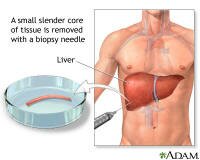What does the liver do?
The liver is a vital organ, having a wide range of jobs, including helping to eliminate drugs (detoxification), protein synthesis (to aid in digestion), and the production of other bio-factors needed for food digestion - such as bile which helps in the digestion of fats (lipids). The liver also aids in glycogen (food fuel) storage and utilization (as glucose). It helps in the decomposition of red blood cells, plasma protein synthesis, and hormone production.
Chemotherapy and liver toxicity (hepatotoxicity)
 "Patients who are to receive chemotherapy require careful assessment of liver function prior to treatment to determine which drugs may not be appropriate, and which drug doses should be modified.
"Patients who are to receive chemotherapy require careful assessment of liver function prior to treatment to determine which drugs may not be appropriate, and which drug doses should be modified.
Following therapy abnormalities of liver function tests may be due to the therapy rather than to progressive disease, and this distinction is of critical importance.
Furthermore, not all abnormalities in liver function are due to the tumor or its treatment, and other processes, such as hepatitis, must be kept in mind." [1]
Life Style that Supports Better Liver Function?
Topic Search: PubMed
Life style factors associated with higher risk of liver problems include, weight gain and a diet with high amounts of unhealthy facts, alcohol consumption, inadequate hydration (drinking of water), drug use, excessive intake of vitamin A supplements, and lack of exercise.
Liver Function Tests
Alanine Aminotransferase (ALT): ALT is the enzyme produced within the cells of the liver. The level of ALT abnormality is increased in conditions where cells of the liver have been inflamed or undergone cell death.
Aspartate Aminotransferase (AST): This enzyme also reflects damage to the hepatic cell. It is less specific for liver disease. It may be elevated by other conditions.
Direct Bilirubin: If the direct Bilirubin is low, while the total Bilirubin is high, this reflects liver cell damage or bile duct damage within the liver itself.
Albumin: Albumin is the major protein present within the blood. Albumin is synthesized by the liver. As such, it is a marker for the ability of the liver to synthesize proteins.
Prothrombin time (PT): Another measure of hepatic synthetic function is the prothrombin time. Prothrombin time is affected by proteins synthesized by the liver.
Platelet count: Individuals with liver disease can develop a large spleen. As this process occurs platelets are trapped within the sinusoids (small pathways within the spleen) of the spleen. While the trapping of platelets is a normal function for the spleen, in liver disease it becomes exaggerated because of the enlarged spleen (splenomegaly).
Serum protein electrophoresis: This test can be useful for evaluation of patients who have abnormal liver function tests since it allows a direct quantification of multiple different serum proteins.